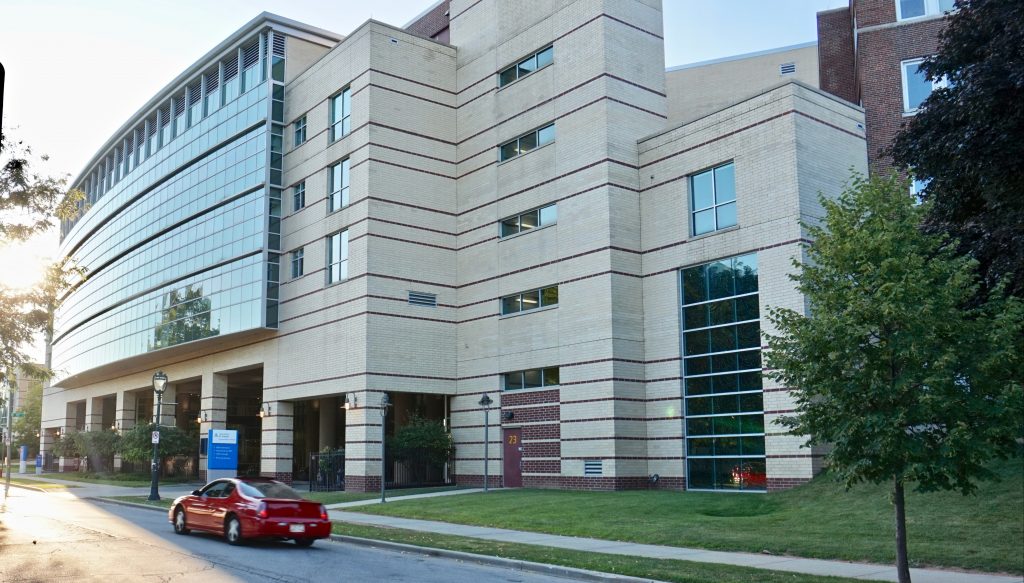St. Joseph Hospital Announces Three-Year Plan
A focus on access to care, chronic disease prevention, infant mortality, mental health.

Ascension St. Joseph hospital, located in Sherman Park, is an essential provider of medical services to North Side residents. Photo by Andrea Waxman/NNS.
Ascension St. Joseph Hospital will focus on access to care, chronic disease prevention, infant mortality and mental health, according to a detailed three-year plan being released Wednesday.
The Community Health Improvement Plan for Ascension Wisconsin’s five Milwaukee County hospitals, including St. Joseph, lists four priorities and the strategies the healthcare system will implement to address them.
Among its strategies for increasing access to healthcare services for St. Joseph patientsare:
- Increasing access to prescription medications. Patients who cannot afford the medicines they need will be connected to one of three programs, depending on their financial position, that offer the drugs at reduced prices.
- Making transportation, including ride-hailing services like Lyft, available for non-emergency patients. St. Joseph staff will screen patients to see if they have transportation barriers and follow up afterward to see if these services were effective.
- Connecting uninsured and underinsured individuals with no-cost medical services, including primary and specialty care, through the Specialty Access for Uninsured Patients Program.
- Connecting patients, especially those who come to the emergency room, with consistent primary care providers offering ongoing healthcare services.
Ascension Wisconsin’s strategies for chronic disease prevention at St. Joseph include:
- Creating a heart and vascular center that will bring a three-doctor practice to provide education, disease prevention and treatment services for heart and circulatory health.
- Offering a program to increase exercise in partnership with the Rite-Hite YMCA that includes an appointment with a personal trainer, weight and stress management, a blood pressure self-monitoring program and water exercise.
Strategies at St. Joseph for reducing infant mortality will include:
- Coordinating prenatal care to ensure access to medical, social, educational and other services to high-risk pregnant women.
- Expediting pregnancy testing and enrollment in BadgerCare Plus to ensure early and consistent access to medical appointments, immunizations and oral health care necessary for positive maternal and infant health outcomes.
- Enhancing St. Joseph’s prenatal care team by hiring three to five midwives.

Derrick Rogers, program director, 414 LIFE, Uniting Garden Homes Inc., speaks at an April news conference at Froedtert Cancer Center. The city’s Office of Violence Prevention announced new partnerships with Froedtert & the Medical College of Wisconsin and Ascension Wisconsin to pilot a hospital-based violence reduction program. Photo by Andrea Waxman/NNS.
To address mental health at Ascension St. Joseph, strategies will include:
- Partnering with local agencies to provide a program called Question, Persuade and Refer, which trains lay people to recognize and appropriately respond to individuals at risk for suicide.
- Giving parents simple and practical strategies to help them build strong, healthy relationships, confidently manage their children’s behavior and prevent problems from developing through the evidence-based Triple P Positive Parenting Program.
- Continuing participation in a hospital-based pilot program with the City of Milwaukee Health Department’s Office of Violence Prevention’s 414Life violence interruption initiative, launched in spring 2019. The program seeks to mediate conflicts, prevent retaliation and other potentially violent situations and connect individuals to community supports.
The priorities were selected through a Community Health Needs Assessment process led by the Milwaukee Health Care Partnership, which includes Ascension Wisconsin, Advocate Aurora Health, Children’s Hospital of Wisconsin and Froedtert and Medical College of Wisconsin. The process included a community health survey, community health data from public sources and key stakeholder interviews.
This story was originally published by Milwaukee Neighborhood News Service, where you can find other stories reporting on eighteen city neighborhoods in Milwaukee.





















